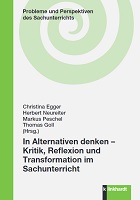In Alternativen denken – Kritik, Reflexion und Transformation im Sachunterricht
| dc.contributor.editor | Egger, Christina | |
| dc.contributor.editor | Neureiter, Herbert | |
| dc.contributor.editor | Peschel, Markus | |
| dc.contributor.editor | Goll, Thomas | |
| dc.date.accessioned | 2024-04-26T13:09:59Z | |
| dc.date.available | 2024-04-26T13:09:59Z | |
| dc.date.issued | 2024 | |
| dc.identifier | ONIX_20240426_9783781560772_8 | |
| dc.identifier | ONIX_20240426_9783781560772_8 | |
| dc.identifier | OCN: 1432461201 | |
| dc.identifier.uri | https://library.oapen.org/handle/20.500.12657/90050 | |
| dc.language | German | |
| dc.relation.ispartofseries | Probleme und Perspektiven des Sachunterrichts | |
| dc.subject.classification | thema EDItEUR::J Society and Social Sciences::JN Education::JNL Schools and pre-schools::JNLB Primary and middle schools | |
| dc.subject.other | Grundschule | |
| dc.subject.other | Sachunterricht | |
| dc.subject.other | Gesellschaft der Didaktik des Sachunterrichts GDSU | |
| dc.subject.other | Hochschullehre | |
| dc.subject.other | Hochschuldidkaktik | |
| dc.subject.other | Unterrichtsgestaltung | |
| dc.subject.other | Medienpädagogik | |
| dc.subject.other | Digitalisierung | |
| dc.subject.other | UN-Kinderrechtskonvention | |
| dc.subject.other | Inklusion | |
| dc.subject.other | partizipative Forschung | |
| dc.title | In Alternativen denken – Kritik, Reflexion und Transformation im Sachunterricht | |
| dc.type | book | |
| oapen.abstract.otherlanguage | Kinder wie Erwachsene stehen angesichts der vielfältigen Problemfelder des 21. Jahrhunderts vor enormen Herausforderungen, deren Bewältigung aufgrund ihrer Komplexität alternative Denkweisen erfordert. Dabei spielen transformative Bildungsprozesse im Sachunterricht, die u.a. kritisches und lösungsorientiertes Denken, Kreativität und Selbstreflexion fördern wollen, eine bedeutsame Rolle. Im vorliegenden Band werden diese Herausforderungen und Möglichkeiten unter folgenden Gesichtspunkten diskutiert: Was bedeuten kritisches Denken, Selbstreflexion und transformatives Lernen im Kontext von Hochschullehre bzw. Hochschuldidaktik im Sachunterricht? Welche Rolle spielen diese in der Praxis des Sachunterrichts? Welche Denk-, Arbeits- und Handlungsweisen erscheinen beim Denken in Alternativen besonders bedeutsam und welche Herausforderungen ergeben sich daraus mit Blick auf Grundschulkinder? Welche Rolle spielen Medien und Digitalisierung beim Denken in Alternativen?; Children and adults alike are facing enormous challenges in the face of the diverse problem areas of the 21st century, and overcoming them requires alternative ways of thinking due to their complexity. In this context, transformative educational processes in science lessons, which aim to promote critical and solution-orientated thinking, creativity and self-reflection, among other things, play an important role. This volume discusses these challenges and opportunities from the following perspectives: What do critical thinking, self-reflection and transformative learning mean in the context of university teaching or university didactics in subject teaching? What role do these play in the practice of subject teaching? Which ways of thinking, working and acting appear to be particularly important when thinking in alternatives and what challenges arise from this with regard to primary school children? What role do media and digitalisation play in thinking in alternatives? | |
| oapen.identifier.doi | 10.35468/6077 | |
| oapen.relation.isPublishedBy | 9a084ee3-3f86-4be2-81d6-89c9fbc5f173 | |
| oapen.relation.isbn | 9783781526235 | |
| oapen.series.number | 34 | |
| oapen.pages | 167 | |
| oapen.place.publication | Bad Heilbrunn |

